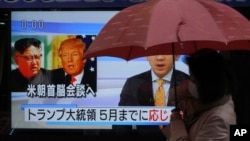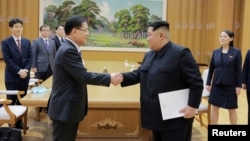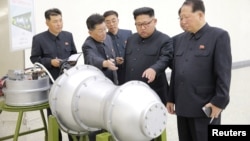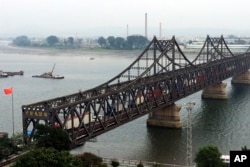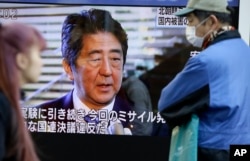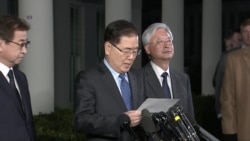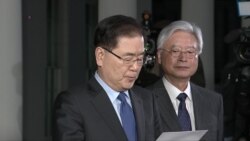U.S. President Donald Trump has agreed to meet with North Korean leader Kim Jong Un “by May” to discuss ending the North’s threatening nuclear program.
The surprising announcement was made Thursday evening by Chung Eui-yong, the head of South Korea’s National Security Office, who was in Washington to brief Trump, and White House officials including National Security Advisor H.R. McMaster, on diplomatic progress made during his visit to Pyongyang earlier this week. He also conveyed a verbal invitation from the North Korean leader to the U.S. president.
“President Trump appreciated the briefing and said he would meet Kim Jong Un by May to achieve permanent denuclearization,” Chung said.
Dramatic change
U.S. Secretary of State Rex Tillerson said a “dramatic” and surprising change of posture by Kim Jong Un led President Donald Trump to agree to a meeting with the North Korean leader. Tillerson is on a one-week, five-nation trip across Africa. He spoke to reporters Friday in Djibouti City, Djibouti.
The secretary said the U.S. was taken aback at how “forward-leaning” Kim was in his conversations with a visiting South Korean delegation. He said it was the strongest indication to date of Kim’s “not just willingness but really his desire for talks.”
Tillerson says Trump made the decision himself after determining the time was right for talks but not formal negotiations.
But he says it will take “some weeks” to arrange timing for their meeting.
South Korea shuttle diplomacy
Chung led a South Korean diplomatic delegation that met with the North Korean leader in Pyongyang on Monday. Afterward, he communicated Kim’s willingness to engage with the U.S. in denuclearization negotiations, and his promise to suspend nuclear and missile tests while talks are underway.
Pyongyang’s position, as stated by Chung, is that “it would have no reason to possess nuclear weapons should the safety of its regime be guaranteed and military threats against North Korea be removed.”
The North Korean government has not yet confirmed the South Korean interpretation of the potential diplomatic breakthrough or the invitation.
On Twitter, White House Press Secretary Sarah Huckabee Sanders confirmed that Trump will accept the invitation to meet with Kim “at a place and time to be determined,” and added that, “in the meantime all sanctions and maximum pressure must remain.”
The prospect of denuclearization talks could significantly de-escalate heightened tensions over North Korea’s accelerated nuclear and ballistic missile tests over the past two years, and efforts to develop operational capability to target U.S. mainland cities with a nuclear-armed intercontinental ballistic missile.
Trump’s “maximum pressure” approach led international efforts to impose tough sanctions in 2017 that banned billions of dollars’ worth of North Korean coal, iron ore, clothing products and seafood exports. The Trump administration has also emphasized a willingness to use military force, if needed, to eliminate the nuclear threat.
As the U.S. intensified pressure, South Korean President Moon Jae-in tried to create diplomatic space by facilitating North Korea’s participation in the Pyeongchang Olympics. Also, North Korea has not conducted any provocative tests since November 2017.
Moon Jae-in, in a statement read by his spokesman Friday, says the summit between Trump and Kim will be a “historical milestone” that will put the denuclearization of the Korean Peninsula “really on track.”
Moon also complimented Trump for accepting Kim’s invitation for a summit, saying Trump’s leadership will be praised “not only by the residents of South and North Korea but every peace-loving person around the world.”
Seoul also announced this week that Moon and Kim will hold an inter-Korean summit in April, at the truce village of Panmunjom, on the South Korean side of the demilitarized zone border region. This will be the third summit between the leaders of North and South Korea and the first since 2007.
Military exercises
On Thursday, Chung added the North Korean leader will not object to the resumption of U.S.-South Korea joint military exercises expected to start in April.
“He understands that the routine joint military exercises between the Republic of Korea and the United States must continue,” Chung said.
Earlier, North Korean state media warned that Pyongyang would respond to the resumption of the joint drills, possibly by resuming provocative nuclear and missile tests, even if it means triggering further sanctions.
The annual exercises were postponed to maintain a peaceful atmosphere during the Winter Olympics and Paralympics being held in South Korea, but are expected to begin at the end of March or early April. More than 20,000 American troops, 300,000 South Korean forces, and an array of bomber aircrafts, fighter jets and warships have participated in past exercises.
North Korea has denounced these military exercises that have included “decapitation drills” to attack the leadership and key installations in North Korea in the event of war, as “rehearsals for invasion.”
The U.S. maintains the joint exercises are defense-oriented and legal under international law, as opposed to North Korea’s nuclear program, which Washington says threatens its neighbors and the world, and has been repeatedly sanctioned by the Untied Nations.
Cautious optimism
The prospect of constructive engagement between Trump and Kim follows a tense period in which the leaders of the U.S. and North Korea exchanged not only threats of military retribution, but also derisive personal insults. Trump called the North Korean leader “little rocket man” and Kim called the U.S. president a “dotard,” an archaic English word meaning old and senile.
North Korea’s openness to talks has been received with a mix of cautious optimism and skepticism. Pyongyang has broken past agreements to end its nuclear program, in exchange for economic assistance and security guarantees.
North Korea may try to seek immediate sanctions relief for freezing its current nuclear arsenal — estimated to be between 13 and 30 nuclear weapons, and hundreds of medium- and long-range missiles — while putting off any significant measures to dismantle its nuclear capacities.
Japanese Prime Minister Shinzo Abe, who has been suspicious of North Korea’s motives, spoke with Trump on Thursday and praised his hard-line leadership for forcing Pyongyang to change. Abe said he plans to visit Trump in Washington next month to discuss the summit with North Korea.
It is also unclear that the U.S. and North Korea can agree what the goal of the denuclearization talks should be.
WATCH: Chung: Kim Jong Un Is Committed to Denuclearization
Washington wants to dismantle Pyongyang’s nuclear program. But North Korea’s long-standing requirement for denuclearization includes the removal of all U.S. forces from the Korean Peninsula, and the withdrawal of the American commitment to use its nuclear arsenal to defend its allies in the region.
Regarding what the U.S. might be willing to concede to get a nuclear deal, North Korea analyst Victor Cha with the Center for Strategic and International Studies in Washington asked on Twitter, “What are we putting on table: sanctions? Normalization? Peace treaty?”
Chung: We Stand Together in Insisting We Do Not Repeat the Mistakes of the Past
President Trump has been critical of past efforts by the administrations of Presidents Bill Clinton, George W. Bush and Barack Obama to resolve the North Korean nuclear threat through negotiations. These past deals slowed the North’s nuclear progress, but Pyongyang covertly continued its development efforts and eventually reneged on pledges to dismantle its nuclear facilities.
Lee Yoon-jee in Seoul and Nike Ching in Djibouti contributed to this report.




